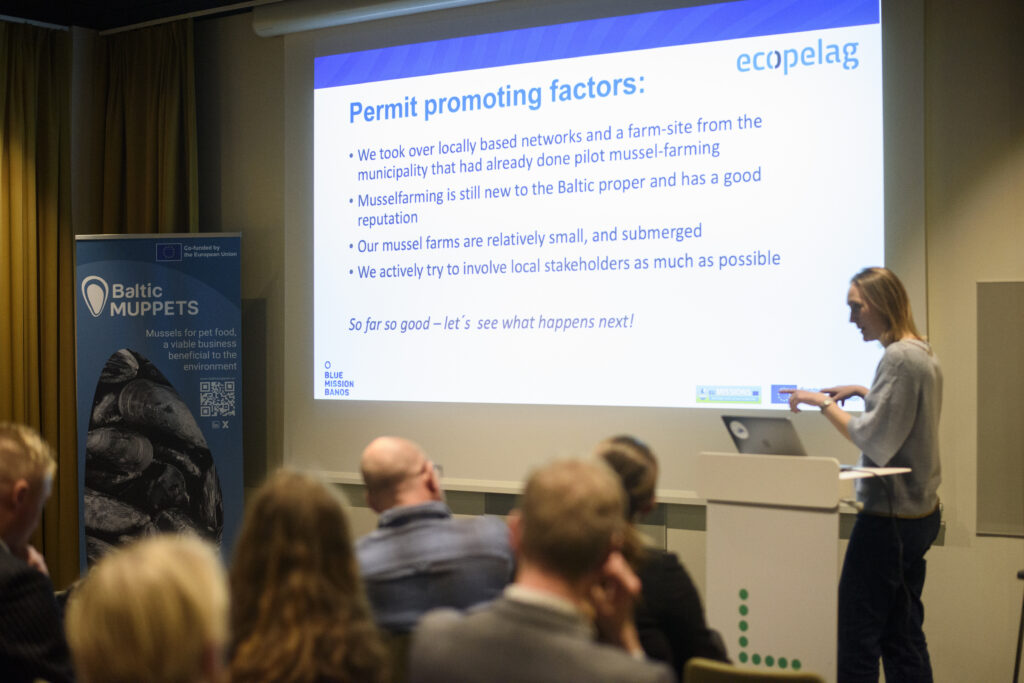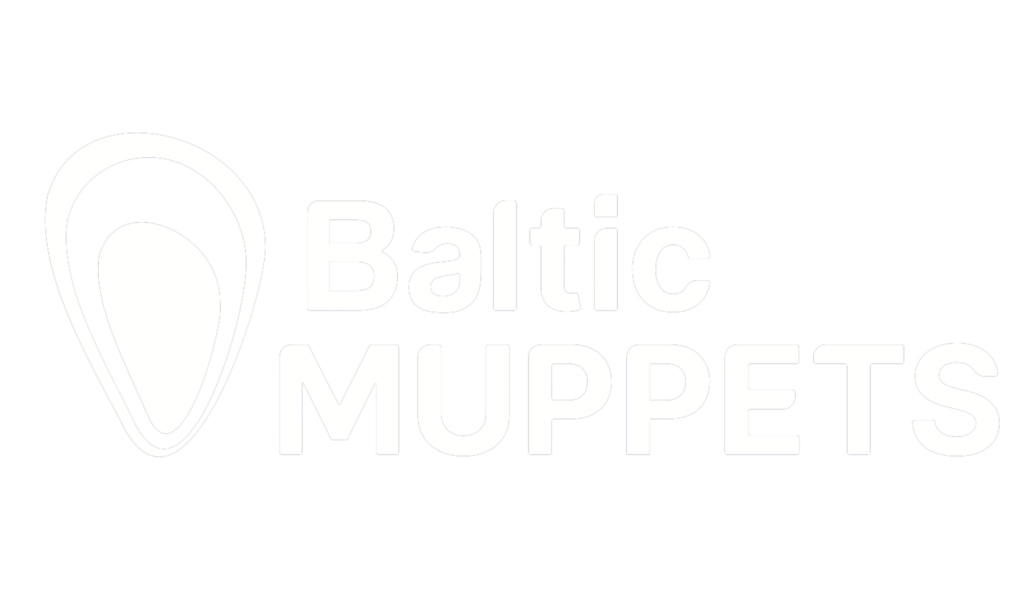Over 500 people involved in the Blue Economy in the Baltic and North Sea and beyond gathered for the 1st Mission Arena, and mussel farming promoters did not miss out on the opportunity to push forward mussel farming as a key element of blue development in these regions.

The Blue Economy plays a pivotal role in ensuring the sustainable future of the Baltic and North Sea (BANOS) regions. From fisheries to aquaculture, shipping to renewable energy, marine resources are central to driving economic growth, innovation, and environmental stewardship.
The BlueMissionBANOS is committed to nurturing a carbon-neutral, circular blue economy by uniting stakeholders from policy, industry, science, and the public. This comprehensive initiative addresses environmental concerns, including water pollution prevention, protection and restoration of marine ecosystems, and biodiversity preservation.
From November 14th to 16th, the Lindholmen Conference Centre in Gothenburg, Sweden hosted over 400 participants from the BANOS region and beyond. They engaged in 30+ dynamic workshops covering aquaculture, policy, regulation, shipping, citizen engagement, business, renewable energy, and more.
Baltic MUPPETS seized this opportunity to promote mussel farming for its contributions to solving eutrophication, food security, and climate change. The project hosted two workshops as part of the 1st Mission Arena programme. Additionally, the Baltic MUPPETS project partners did not miss the opportunity to meet physically and review the progress achieved in the last year and discuss upcoming activities.
Size Matters
Mussels, recognized for their ability to enhance water quality and biodiversity, and contribute to CO2 sequestration, face ongoing discussions hindering their development, especially, around the dimensions of harvested mussels and the size of farms, particularly in coastal settings. The workshop ‘Mussel sizes matter: elucidating scientific facts and finding a way forward together’ delved into the environmental and socio-economic aspects of mussel farming, especially focusing on the dimensions of harvested mussels and farm sizes, particularly in coastal areas, in the Western Baltic.
The critical role of social acceptance in advancing mussel farming was underscored. Nardine Stybel (EUCC-DE) presented a paper on “Mussel Farm Location in the Baltic Sea – Community Acceptance or Distrust,” highlighting that visible environmental disturbance can diminish social acceptance, often linked to concerns about other aquaculture forms or industrial developments. Recommendations included early awareness campaigns, active community engagement, and adaptations based on socio-cultural nuances.

Anne Stald Møllmann from Havhøst – Ocean Harvest showcased the project’s work engaging small coastal communities in Denmark to develop regenerative mussel and seaweed farms. This fostered community bonds and produced blue food products. The session also featured presentations by Marie Maar from Aarhus University, discussing basin-scale ecosystem services modelling and impacts of suspended mussel culture, and Peter Krost from Coastal Research & Management, addressing socio-economic needs related to mussel farming, with a focus on developing products from small Baltic mussels for pet-food markets. The session concluded with a presentation by Andreas Holbach from Aarhus University who talked about the scalability and nutrient removal capacity of mussel mitigation farming under different placement scenarios.
The workshop emphasized the need for clear evidence in maritime spatial planning, increased social license to operate, and reduced investment risks to boost mussel production and meet Mission Ocean targets by 2030. The discussions explored challenges and opportunities, laying the foundation for informed strategies to drive sustainable growth in mussel farming and its potential contribution to a sustainable future.
Licensing in low-trophic aquaculture
Licensing in low-trophic aquaculture might not sound thrilling at first, but the workshop ‘The Dos and Don’ts of Low-Trophic Aquaculture,’ organized by Baltic MUPPETS, created the perfect atmosphere for mussel producers from Germany, Sweden, and Denmark to share their experiences and recommendations.
Unlocking the potential of mussel farming still requires coordinated action on all elves to provide the necessary legal framework and permits for production. Long and complicated licensing procedures often hinder the establishment or scale-up of farms. Besides, insufficient consideration in Maritime Spatial Plans results in a lack of suitable sites. Low public awareness or false information about low trophic aquaculture, mainly when not distinguished from fish aquaculture, limits public support for the sector’s development.

Tim Staufenberger from the German Kieler Meeresfarm GmbH opened the ground by sharing insights into the application process of his mussel and algae farm, which included interactions with four different authorities and a final application of more than 80 pages as well as the necessity to search for submerged munition from the World Wars. Susanna Minnhagen, from the Swedish mussel farm Ecopelag, followed by sharing their recent and positive experiences with the local authorities when taking over and expanding a mussel farm site in the Västervik archipelago. She mentioned that even when was not compulsory, in the process of planning they carried out stakeholder discussions with water owners, fishers, and a regional interest association, which has been a key element for their successful operation.

For Denmark, the workshop included two cases: commercial mussel farming and hobby small-scale mussel farming. To provide context on the state of commercial mussel farming, Annette Løttrup-Moore from Business Lolland-Falster –a regional business organisation working closely with local businesses, educational institutions and interest organisations– shared the strong interest in developing low-trophic aquaculture in Lolland-Falster as the conditions are excellent with 600 km of coastline and the necessary infrastructure. However, a temporary halt to new applications for mussel and oyster cultivation permits, introduced by the Danish Veterinary and Food Administration on July 1st, 2021, made applying for a new license impossible. Additionally, in the Maritime Spatial Plan launched in 2023, minimal space for aquaculture was allocated in their region. Currently, they are working together with the regional authorities to seek strategies to overcome this.
To complement this, Per Dolmer, from Blue Research, presented different forms of mussel farming for food, feed, and nature restoration, including compensation farming, which entails payments for ecosystem services. The latest requires an entirely new legal and management framework. He also explained the reasons for the decreased social acceptance of mussel farming in Denmark in recent years and the necessity to raise awareness of the positive impacts and improve mussel production’s reputation by communicating correct data and information to the public.
Joachim Hjerl from Havhøst – Ocean Harvest presented their mussel cultivation kit, allowing everyone to produce mussels as a hobby, individually or in community gardens. Havhøst developed with local authorities the possibility of a simplified application process and a one-page template for applying for a permit that allows non-commercial low-trophic aquaculture activities in Denmark.

Here are key takeaways from the workshop:
- “One-stop” application, meaning one authority responsible for the whole process and coordinating with other authorities concerned.
- Adapted application process by size: simplified process for hobby activities and small-scale farms.
- Decoupling permits and discussions for low-trophic aquaculture from fish farming and agriculture nutrient inputs.
- Increase social acceptance by raising awareness of the environmental benefits of low-trophic aquaculture by distinguishing it from fish aquaculture.
Not just talk: Tasting the Sea
The event also embraced a hands-on experience with a session titled “Taste the Sea.” Attendees had the opportunity to sample various seaweed and mussel products, including seaweed spreads, snacks, and collagen drinks. Mussel products could not be missed, mussel meatballs and freshly baked bread with butter and mussel powder were served, impressing the palates of the participants. The culinary showcase underscored the vast potential of integrating low-trophic aquaculture products into everyday life.

Looking ahead to Tallinn
The 1st Mission Arena marked the beginning of a series of events by the BlueMissionBANOS project. The upcoming 2nd Mission Arena in Tallinn, Estonia, on April 25th and 26th, 2023 will focus on the local and regional communities of Estonia, Latvia, Finland, and Sweden (Gotland and the southeast). These events provide a platform for collaboration within the Blue Economy, so mark your calendars and see you in Tallinn!
Visit the BlueMissionBANOS website to stay updated.



